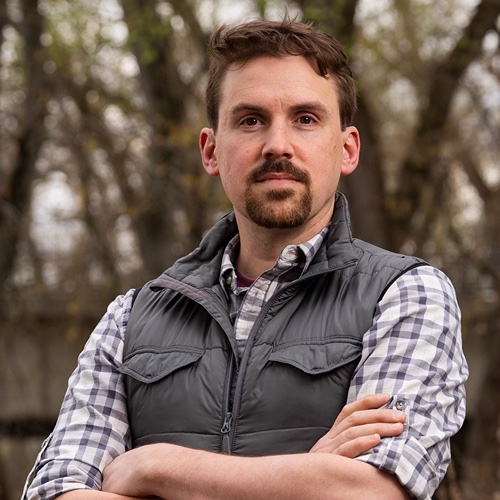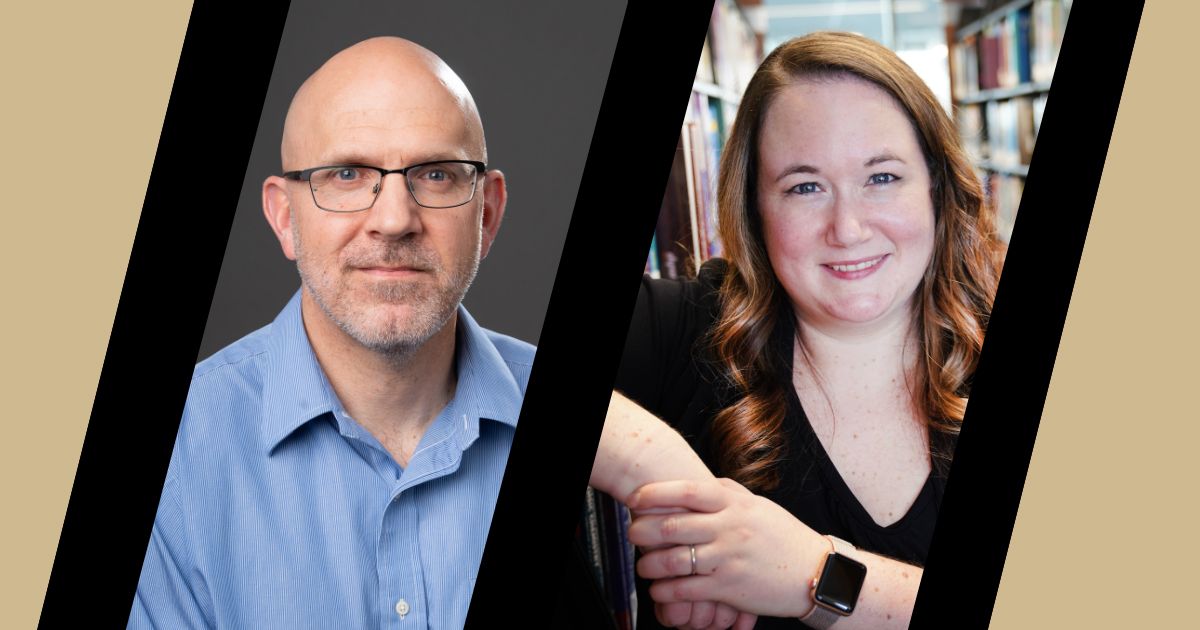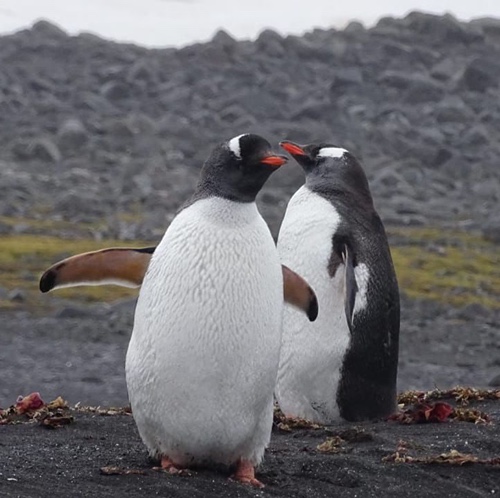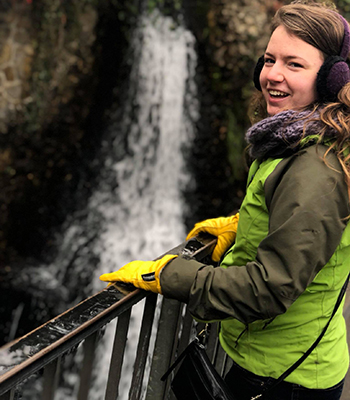 “A pivot is a change in strategy without a change in vision” – Eric Ries.
“A pivot is a change in strategy without a change in vision” – Eric Ries.
Marissa Cubbage came to Purdue to study the young life stages of fish in the Great Lakes. After arriving in West Lafayette in July 2019, she laid out the plans for her master’s degree research on lake whitefish – Coregonus clupeaformis - in Green Bay, Lake Michigan.
“I chose the lake whitefish, which is a coregonid species, mainly because it is the largest commercial fishery in the Great Lakes,” Cubbage explained. “They are also native to the Great Lakes and are a species that has a unique evolutionary history and culture. I really like when science and history and culture intertwine, and I felt there was a lot of history and culture involved with this species.”
Cubbage planned to do her sampling from March to May of 2020 when the larval fish emerge from their eggs and then analyze larval lake whitefish diet and growth rate, due to the trophic gradient from more nutrients to less nutrients throughout Green Bay.
Just two weeks before her sampling was set to begin, state agencies and Purdue University shut down all out-of-state field work due to the COVID-19 pandemic.
Cubbage met with her advisors Paris Collingsworth and Tomas Hook to formulate a plan for moving forward.
“I was really worried about my success as a student, because with a master’s degree you have very limited time, but they were very supportive and gave me a bunch of options of what I could do,” Cubbage recalled. “One of those options was to use previously collected larval samples to really do the same project that I had intended to do, the same type of analysis on the same type of species, just with samples that had already been collected by tribal biologists from the Little Traverse Bay Band of Odawa Indians. They are really interested in coregonids, which are a culturally important group of fish that have been fished as part of subsistence fishing for centuries by this tribe.”
The tribe had collected larval samples from 2015 to 2019 and were willing to share them with Cubbage to further her research, offering a unique glimpse at a longer window of research than the one to two years of sampling that a traditional master’s degree allows.
“I was able to look at such a long time period and look at trends in larval diet and abundance, which was really interesting,” Cubbage said. “These samples had been sitting on the shelf, so they were more than happy to have someone take the samples, make some use out of them and provide information about them.”
Cubbage picked up the larval samples in Ann Arbor, Michigan, and began processing them. The zooplankton, or food that the larvae eat, was processed by the USGS Great Lakes Science Center. Cubbage’s thesis “The Impacts of Altered Zooplankton on Abundance and Community Composition on Larval Fish” looks at the how zooplankton declining in the lakes, due to decreased nutrient loading and the filtration of nutrients and phytoplankton by invasive mussels, has affected the diet of the larval coregonid fish.
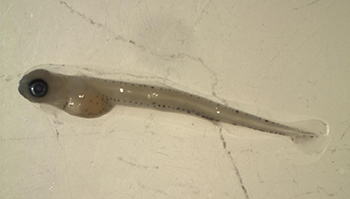 “Diet studies in the Great Lakes have shown that there is a certain type of zooplankton that these larval fish primarily eat, cyclopoid copepods, but unfortunately cyclopoid copepods are particularly in decline and the zooplankton community is dominated by this other type of zooplankton, calanoid copepods” Cubbage said. “Since I knew that the type of copepod they prefer has declined in offshore areas of Lake Michigan, I wanted to see what zooplankton was available in the near-shore beach environment (<1m), where coregonid larvae are first feeding. I documented that these fish are eating and positively selecting for cyclopoid and calanoid copepods. The next step would be to analyze the energetic consequences of this diet shift, considering differences in fatty acid concentrations and the energetic cost of capture between calanoid and cyclopoid copepods.”
“Diet studies in the Great Lakes have shown that there is a certain type of zooplankton that these larval fish primarily eat, cyclopoid copepods, but unfortunately cyclopoid copepods are particularly in decline and the zooplankton community is dominated by this other type of zooplankton, calanoid copepods” Cubbage said. “Since I knew that the type of copepod they prefer has declined in offshore areas of Lake Michigan, I wanted to see what zooplankton was available in the near-shore beach environment (<1m), where coregonid larvae are first feeding. I documented that these fish are eating and positively selecting for cyclopoid and calanoid copepods. The next step would be to analyze the energetic consequences of this diet shift, considering differences in fatty acid concentrations and the energetic cost of capture between calanoid and cyclopoid copepods.”
While the samples and subsequent analysis helped prepare Cubbage for her master’s thesis defense on Nov. 22, her research also will impact the tribe, from the biologists down to subsistence and commercial fishermen.
Cubbage presented her research findings to the tribal biologists and technicians through virtual presentations and meetings. She also created a two-sided handout which will be provided in packets the tribe gives out when issuing subsistence and commercial fishing licenses. Cubbage was also scheduled to present her findings and explain the handout at a subsistence fishing training event this fall, where tribal members were to learn how to use field nets, but the event was cancelled due to local COVID concerns.
“The drive for my extension deliverable was that I wanted to relay information the samples provided to the tribal biologists and members of the tribe, considering the effort the tribal biologists put into collecting the samples,” Cubbage said. “I have made sure that the final data sets go back to the tribe as well, so that they can produce presentations and outreach publications as they see fit.
“I want to share with people who fish, including the tribes who are subsistence fishing, how important the very young life stages of fish are to the adult fishery, and that the prey they eat is changing and declining in the lakes and that may be an issue. Being able to relay that, not just to the biologists, but to some of the people who are fishing would be awesome, and I think that I have been able to do that.”
Cubbage credits her research success to collaboration and relationships.
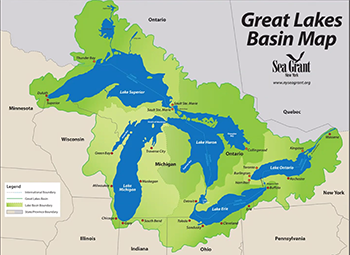 “We really had a connection between the University, government agencies like the USGS, and the tribal biologists, which has been cool,” Cubbage said. “I think that is a mechanism of my advisors and their previous relationships and connections with these agencies. Tomas (Hook) is the director of Illinois-Indiana Sea Grant, and in addition to his position at Purdue, Paris (Collingsworth) is involved with the EPA. It has been nice to be a part of the continuation of those established relationships in a positive way.”
“We really had a connection between the University, government agencies like the USGS, and the tribal biologists, which has been cool,” Cubbage said. “I think that is a mechanism of my advisors and their previous relationships and connections with these agencies. Tomas (Hook) is the director of Illinois-Indiana Sea Grant, and in addition to his position at Purdue, Paris (Collingsworth) is involved with the EPA. It has been nice to be a part of the continuation of those established relationships in a positive way.”
Cubbage’s ability to pivot and complete her research has impressed Collingsworth.
“Marissa had worked so hard to design a field research project that we were just getting ready to execute, and then it was heartbreaking to see all of that taken away by COVID restrictions at the last minute,” Collingsworth said. “To her credit, she bounced right back and really took advantage of the opportunity to lead a research project, perhaps just not in the way she had originally imagined it. In the end, Marissa was able to build a collaborative study with our research partners across the Great Lakes and the outcome will likely be more impactful than what we had originally planned.”
Cubbage, who earned her bachelor’s degree in fisheries and aquatic science and worked mostly with river and stream ecology at Juniata College, will be returning to her roots after completing her master’s degree. She has accepted a full-time position with the Indiana Department of Environmental Management, where she will work as a macroinvertebrate specialist.
“I am going back to river and stream biology,” Cubbage shared. “Every few years I like to do something different so I’m excited to stay in the area and collect samples from streams all across Indiana next summer. We also have some genetic data coming in on the larval coregonids, so once those results are in, we definitely want to publish this study in a scientific journal.”
Writer: Wendy Mayer, Communications Coordinator

